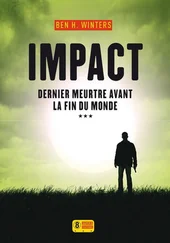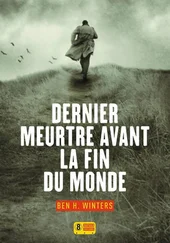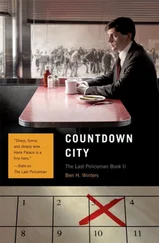“Idiot,” I call myself, and “asshole,” as I prowl around to the rear of the house, to where the pool stretches out in a perfect pristine rectangle, its even blue surface shimmering with the shadow of the house itself. I’ve come around to the back to make sure there aren’t any contraindicating facts, but really, just to have a second alone, alone with my lumbering thoughts, with my anger and self-recrimination—and with the capture op, lone representative of the Record. He has trailed me and stands now at a respectful ten-foot distance, his handheld trained on me, standing heavily on the lawn. Reality in progress.
I think I’ve seen this op before—a shaggy-headed dude named Morgan or Marcus, something like that. Convention dictates that you ignore the Record’s representatives, but a lot of people will say hello, give a nod or a smile. Not me. I keep my hands deep in my pockets, stare by turns at the roof, the lawn, the pool.
The sun scatters its golden light across the moment, glittering on the rooftop, glinting on the blue of the pool, dappling the deep green of the lawn. The damn roofer should have had the good sense to fall off this side of the house. He might have saved himself a broken neck. Might have drowned instead.
There’s a back door, coming off the pool patio, a pair of elegant French doors that allow no clear view of whatever choices are made inside the house. I look up at that house, debating whether to take the extra five minutes to haul myself up there, push a ladder against the stuccoed white walls, and have a closer look at the spot where the roofing tiles gave way. Make sure. Make double and triple sure.
But I’d only be doing it by way of apology to Ms. Paige, a half-assed dumb show of contrition: Look, maybe you were right. Maybe there’s one more flat fact to be found, another tile for us to lay into the mosaic . Only I know there’s not. What happened is what happened. It was a tragedy, maybe, but there is no anomaly, no lie hidden, obscured, and in wait beneath the surface, like a snake under the soil. All the facts are flat and simple. All the lines between them are clean and direct.
I am not the monster that I sometimes appear to be. Not at the core, not down at the bone. I understand young Paige’s eagerness, her fervency, the fundamental truth of her, coming off the kid in waves. She wants to speculate because that’s what Speculators do. We are the ones with the power, and the license, to truck with lies—we can sense them, we can handle them, and we are empowered to emit them our own damn selves. To construct different versions of the truth so each can be tested, so all might fall away until only the real one remains.
Ms. Paige just wants to do the damn work.
And here I come to explode at her for committing the crime of caring too much? Of hoping to find something lurking beneath the surface?
The question is, what kind of fundamental truth is coming off me?
Back in front of the house, the ambulance has maneuvered onto the lawn and parked among the other emergency vehicles under the meager shade of the very tall palms, and now I shade my eyes and watch the men with their stretchers trot across the lawn to bear away the victim. The ambulance crew is trailed by its own capture team: more capture operators, more microphone bearers, more archivists. I watch them watching as the paramedics lift the body and arrange it on the stretcher.
“Sir?”
It’s her again. Tapping on my shoulder. Chin set, eyes clear, bowed but unbent. She has some nerve, this one; she has some fight in her for sure.
And now the sunlight of good feeling fills me up, and I smile for what feels like the first time today. For what feels, indeed, like the first time in a good long time.
“What is it, kid?”
“I decided to speak to some of the witnesses, sir. As long as I was waiting.”
She winces, waiting for me to holler at her, but I don’t.
“And?”
“And there’s someone I think you should speak to.”
“It’s Buddy Renner. Like, ah, like ‘ runner ,’ person who runs, but with an e where the u goes— Renner . I’m thirty-six years old. I’m a manager. I was born in Pasadena, but I live down in South Beach now. These guys are my crew. I’m their manager. Not of the… not the whole company . I’m a field manager. I run this crew. Company manager is Lexie Herrimann. Two r s, two n s. Herrimann .”
I put it all down in my Day Book, my stubby fat hundred-pager. I write in my book even though Renner’s rambling testimony is being captured by my pinhole and by the captures along the gutters of the house and in the trees, and by the roving team too. There are plenty of Speculators who don’t bother with the Day Book unless it’s a matter of clear and immediate importance, something that’ll surefire need to be on the Record. But I’m old-school. I like to do it right.
“I was the one that found him, actually,” says Renner. “I got here at, ah, boy, I guess about—” He pauses, squeezes shut his eyes with the effort of recollection. “Six oh nine. That’ll… That’s… You can check the stretches on that, right? But so, okay, the crew was called for six thirty. So he was—Crane was—he was early, and I was early but not as early as him.”
“You don’t all arrive together?” I ask, pointing to the three pickups along the driveway. “In the trucks?”
“No. Ah—no, sir. You can. Some of the guys will come into the office, and—but, no. You can get to the work site, you get to the work site.”
I nod for him to continue, and he swallows, takes a deep breath. He keeps glancing at the pinhole, same nervous little glance Ms. Tarjin kept doing. There are plenty of ground and air captures around, so people don’t understand why we have to have ’em, too, the point of view, and maybe it’s just psychological. Or maybe you can never have too much truth.
“And so I found him—on the ground there. Just—that’s just how I found him.”
The man is sputtering out facts, scattershotting every squib of truth that occurs to him. It’s irritating, but useful for investigative purpose.
“Okay,” I tell him, battling my impatience. “We got that.”
Renner’s a sweaty mess, in the same dark green shirt and dark green pants of the dead man and the rest of his crew: day laborers in heavy work clothes and sturdy boots, roofers and tar pourers and layers of tile, all of whom are still milling about in the unaccustomed state of having nothing to do, waiting in the shade of the single broad-branched aspen under which they have been corralled. They’re smoking, murmuring to one another, casting occasional nervous glances at all the cops and capture teams.
I reconfirm all the flat facts that Renner has already provided to Ms. Paige, who now stands beside me, reading along from her notes. Her Day Book, I notice, is gold, with gold-lined pages. I roll my eyes. There are no regulations on it—nothing in the Basic Law says the Service has to have dark-colored everything. But gold?
Renner and his crew—among them the dead man, Mose Crane—have been working the roofing job here at 3737 North Vermont for nineteen days, doing a series of patches and small repairs above the master bedroom suite.
“Officer Paige stated to me that you stated to her that Mr. Crane has a clean work record, as far as you know, with no previous reported accidents.” I watch him, stone-faced. “Is that true?”
Renner blinks. “Is it true that I stated it to her?”
“No. Not—” I take a deep breath, in and then out again. Come on. “It’s a two-step verification, Mr. Renner. Can you confirm that the information that you previously provided to Officer Paige was true and complete?”
Читать дальше












